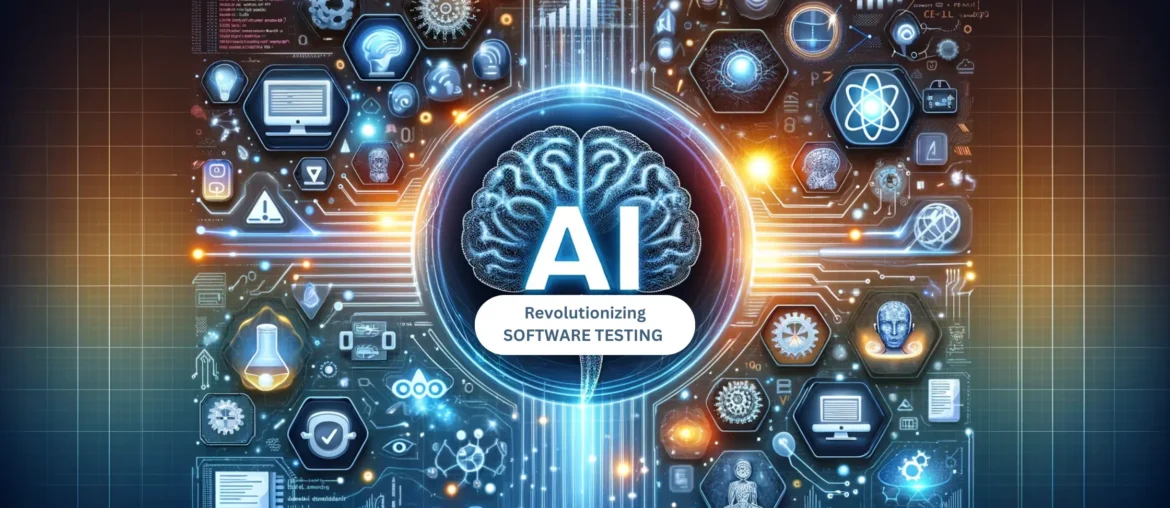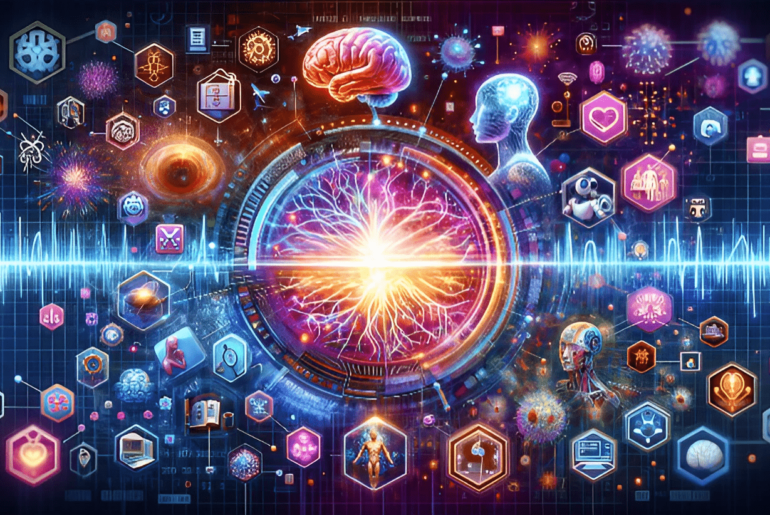In 2023, AI is predicted to be the driving force behind software testing. This is because AI-driven automated testing will allow software to be tested faster and more efficiently than ever before. AI-driven automation will help software developers detect bugs quickly and identify problems before they reach the customer. The impact of AI tools on software development is starting to make itself felt. As developers’ productivity increases, so does the necessity for software testing.
Last year, there were groundbreaking advancements in AI, driven by ChatGPT, DALL-E, and Copilot. In 2023, we expect a significant impact on various applications, including software testing. Regardless of global economic conditions, software testing will become a greater focus for enterprises. With the help of AI, software testing will become more efficient, accurate, and reliable. AI technology can help software developers test software more quickly and efficiently, while also identifying potential problems before they become major issues.
How AI is Revolutionizing Software Testing
Artificial Intelligence (AI) is transforming the way software testing is done. AI-based testing tools are becoming increasingly popular, and the impact of AI on software testing is already visible. In this section, we will discuss the impact of AI on software testing and the AI-based testing tools that are expected to be popular in 2023.
Impact of AI on Software Testing
AI is revolutionizing software testing by introducing greater accuracy and speed. By detecting bugs quicker and faster, AI can give testers the time and mental energy to create better testing methods, write better test scripts, and devise ways to craft the best possible user experience. AI-based testing tools can analyze large amounts of data and identify patterns that humans may miss. This helps testers to find bugs more quickly and efficiently.
AI can also help testers to prioritize their testing efforts. By analyzing the code and the customer’s usage patterns, AI can identify the areas of the code that are most likely to have bugs. This helps testers focus their efforts on the most important areas.
AI-Based Testing Tools in 2023
In 2023, AI-based testing tools are expected to become even more popular. These tools will help testers to automate more of their testing efforts and to identify bugs more quickly and efficiently. Some of the AI-based testing tools that are expected to be popular in 2023 are:
- Testim: This tool uses AI and ML algorithms to automate testing to its full extent. AI is used to speed up the authoring, execution, and maintenance of the tests. Testim includes self-maintenance of automated tests that are ML-based. This results in the fast authoring of stable automated tests.
- Applitools: This tool uses AI to identify visual bugs in web and mobile applications. It can detect visual changes that might be missed by human testers. Applitools uses machine learning algorithms to analyze images and identify patterns that are indicative of bugs.
- Mabl: This tool uses AI to create and maintain automated tests. Mabl can automatically generate tests based on user behavior and identify bugs that might be missed by human testers. Mabl also uses machine learning algorithms to analyze test results and identify patterns that are indicative of bugs.
Overall, AI is revolutionizing software testing by introducing greater accuracy and speed. AI-based testing tools are becoming increasingly popular and expected to become even more popular in 2023. These tools will help testers automate their testing efforts and identify bugs more quickly and efficiently.
AI in Test Automation
AI-Driven Test Automation Tools
In 2023, AI-driven test automation tools are becoming increasingly popular in the software testing industry. These tools are designed to reduce the time and effort required to test software, while also improving the accuracy and reliability of test results.
One such tool is Functionize, which is equipped with machine learning capabilities and designed for mobile app testing. Functionize’s Adaptive Event Analysis feature predicts user interactions to ensure that the app can handle real-world user scenarios. The self-healing tests reduce test maintenance time by up to 85% [1].
Another tool is Eggplant, which has automation as an intrinsic part of its DNA. Eggplant provides AI-driven software testing that is enterprise-ready. It helps enterprises maximize the value of test automation and stay ahead of the competition. Eggplant’s AI-driven testing provides a level of precision and efficiency that was previously unattainable [2].
Benefits of AI in Test Automation
The benefits of using AI in test automation are numerous. One of the main benefits is that it helps to reduce the time and effort required for testing. With AI-driven test automation tools, testing can be performed more quickly and efficiently, allowing software developers to focus on other tasks.
Another benefit is that AI-driven test automation tools can improve the accuracy and reliability of test results. By using machine learning algorithms, these tools can identify patterns and trends in test data that might otherwise be missed. This can help to identify bugs and other issues more quickly and accurately, allowing software developers to address them before they become major problems.
Overall, the use of AI in test automation is becoming increasingly important in the software testing industry. By using AI-driven test automation tools, software developers can improve the accuracy and reliability of test results, reduce the time and effort required for testing, and stay ahead of the competition.
AI in Performance Testing
As software systems become more complex and the demand for high performance increases, it is critical to ensure that software applications perform optimally under various conditions. This is where AI comes in, providing a powerful tool for performance testing, which is the process of determining how well a software application performs under different workloads.
Role of AI in Performance Testing
AI can play a significant role in performance testing by enabling more efficient and effective testing processes. By leveraging AI, performance testing can be conducted more accurately, quickly, and with less human intervention.
AI algorithms can simulate real-world scenarios and generate loads that mimic actual user behavior, allowing developers to identify performance bottlenecks and optimize application performance. AI can also be used to analyze large volumes of data generated during performance testing, providing insights that can help improve application performance.
AI-Enabled Performance Testing Tools
There are several AI-enabled performance testing tools available in the market that can help developers conduct performance testing more efficiently. These tools use AI algorithms to simulate user behavior and generate workloads that mimic real-world scenarios.
Some of the AI-enabled performance testing tools available in the market include:
- LoadRunner: LoadRunner is a performance testing tool that uses AI to provide insights into application performance. It can simulate user behavior and generate workloads that mimic real-world scenarios, allowing developers to identify performance bottlenecks and optimize application performance.
- NeoLoad: NeoLoad is a performance testing tool that uses AI to generate user behavior scenarios and simulate workloads. It can also analyze large volumes of data generated during performance testing, providing insights that can help improve application performance.
- Appvance IQ: Appvance IQ is an AI-enabled performance testing tool that uses machine learning algorithms to generate test cases and simulate user behavior. It can also analyze large volumes of data generated during performance testing, providing insights that can help improve application performance.
In conclusion, AI is set to revolutionize performance testing in 2023 and beyond. With AI-enabled performance testing tools, developers can conduct performance testing more efficiently and effectively, ensuring that software applications perform optimally under various conditions.
Challenges in Implementing AI for Software Testing
While AI has the potential to revolutionize software testing, several challenges need to be addressed before it can be widely adopted. In this section, we will discuss some of the technical and strategic challenges of implementing AI for software testing.
Technical Challenges
One of the main technical challenges of implementing AI for software testing is the lack of data. AI algorithms require large amounts of data to train and improve their accuracy. However, in the case of software testing, there is often a limited amount of data available. This is because software testing is a complex process that involves multiple variables, making it difficult to collect and analyze data.
Another technical challenge is the complexity of AI algorithms. AI algorithms are often complex and require specialized knowledge to develop and maintain. This can make it difficult for software testing teams to adopt AI without the help of experienced AI developers.
Strategic Challenges
The cost is one of the main strategic challenges of implementing AI for software testing. Developing and implementing AI algorithms can be expensive, especially for small and medium-sized companies. This can make it difficult for these companies to adopt AI for software testing, even if it has the potential to improve their testing process.
Another strategic challenge is the lack of understanding of AI. Many software testing teams may not fully understand how AI works or how it can be applied to software testing. This can make it difficult for them to adopt and integrate AI into their testing process.
In conclusion, while AI has the potential to revolutionize software testing, several challenges need to be addressed before it can be widely adopted. These challenges include the lack of data, the complexity of AI algorithms, cost, and a lack of understanding of AI. By addressing these challenges, software testing teams can fully realize the benefits of AI and improve the quality and efficiency of their testing process.
Future of AI in Software Testing
As technology evolves, AI becomes increasingly important in software testing. The use of AI can help improve the efficiency and accuracy of software testing, ultimately leading to better quality software. In this section, we will explore two ways in which AI is expected to shape the future of software testing.
Predictive Analysis in Software Testing
One of the most promising applications of AI in software testing is predictive analysis. By analyzing past testing data, AI algorithms can identify patterns and predict where future defects are likely to occur. This can help software testers prioritize their testing efforts and focus on the areas that are most likely to have issues.
Predictive analysis can also help software developers identify potential issues before they occur. By analyzing code as it is being written, AI algorithms can flag potential defects and suggest fixes before the code is even tested. This can help reduce the time and effort required for testing and ultimately lead to higher-quality software.
AI-Driven Quality Assurance
Another way in which AI is expected to shape the future of software testing is through AI-driven quality assurance. AI algorithms can be used to automatically test software and identify defects. This can help reduce the time and effort required for manual testing and ultimately lead to higher quality software.
AI-driven quality assurance can also help improve the accuracy of testing. By analyzing large amounts of data, AI algorithms can identify patterns and anomalies that might be missed by human testers. This can help identify and address all potential defects before the software is released.
In conclusion, AI is expected to play an increasingly important role in the future of software testing. By using predictive analysis and AI-driven quality assurance, software testers can improve the accuracy and efficiency of their testing efforts, ultimately leading to higher-quality software.
Conclusion
In conclusion, AI is revolutionizing software testing in 2023 and beyond. With the help of AI-driven automated testing tools, software can be tested faster, more efficiently, and more accurately than ever before. AI can help software developers detect bugs quickly and identify problems before they reach the customer, saving time and money.
AI-powered testing tools can also help developers create more robust and reliable software by automating repetitive tasks such as regression and performance testing. This can free up developers to focus on more important tasks such as designing new features and improving user experience.
Moreover, AI can help software developers create more accessible software by identifying and fixing accessibility issues early in the development process. This can help ensure that software is usable by people with disabilities, improving the user experience for everyone.
Overall, the benefits of AI in software testing are clear. As the number of software developers continues to grow and software complexity continues to increase, AI-powered testing tools will become increasingly essential. By embracing AI, software developers can create better software, faster, and more efficiently than ever before.





